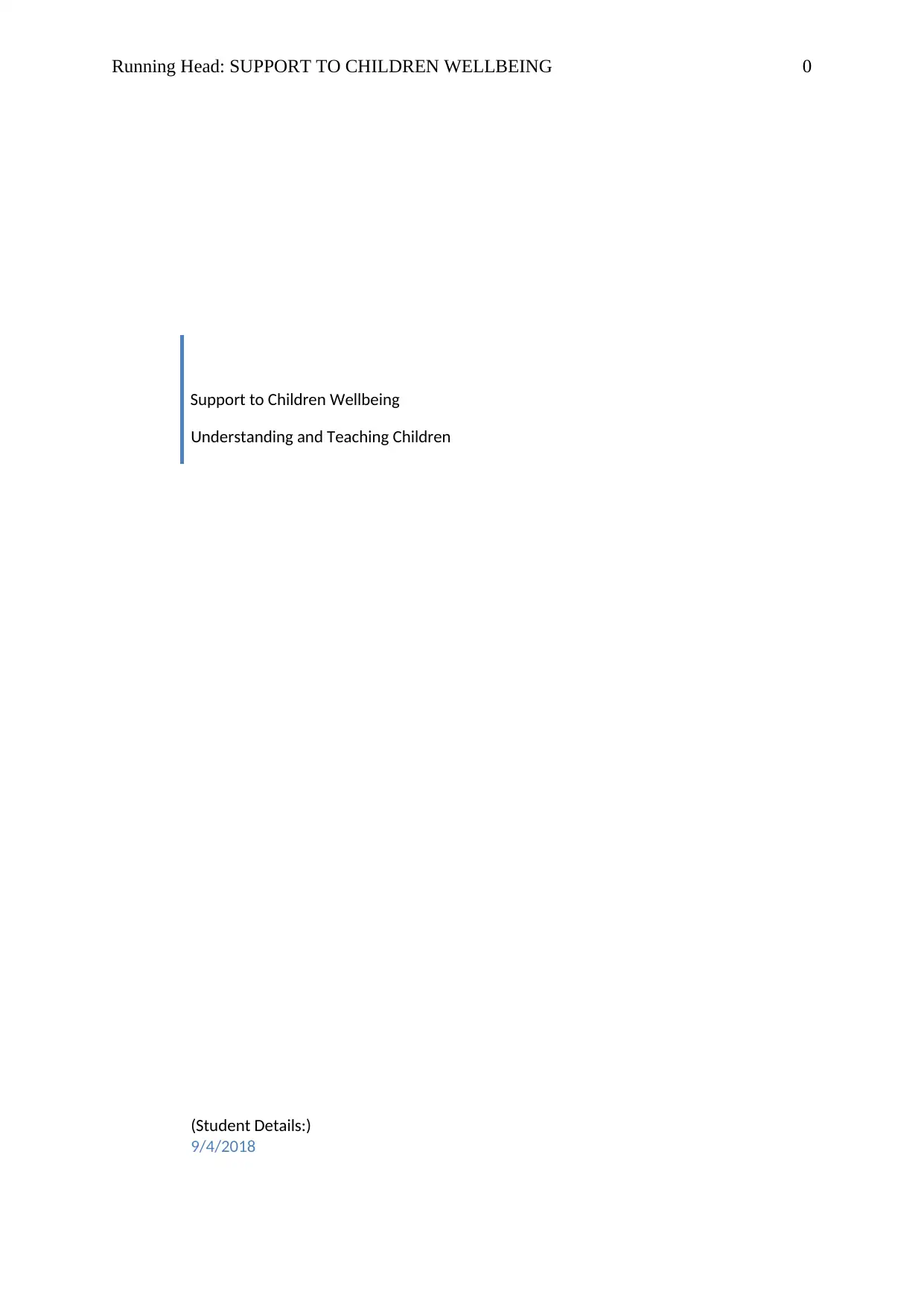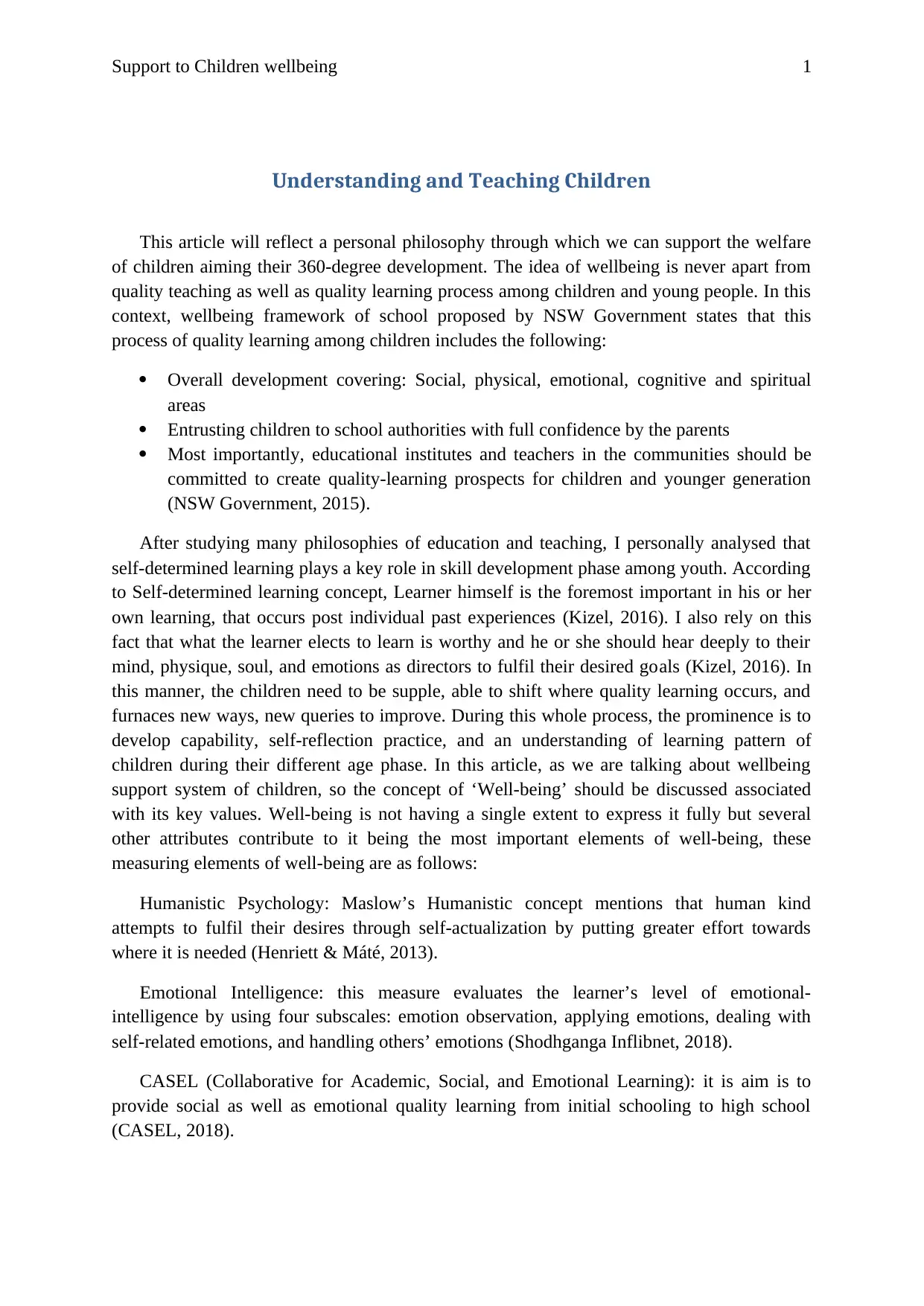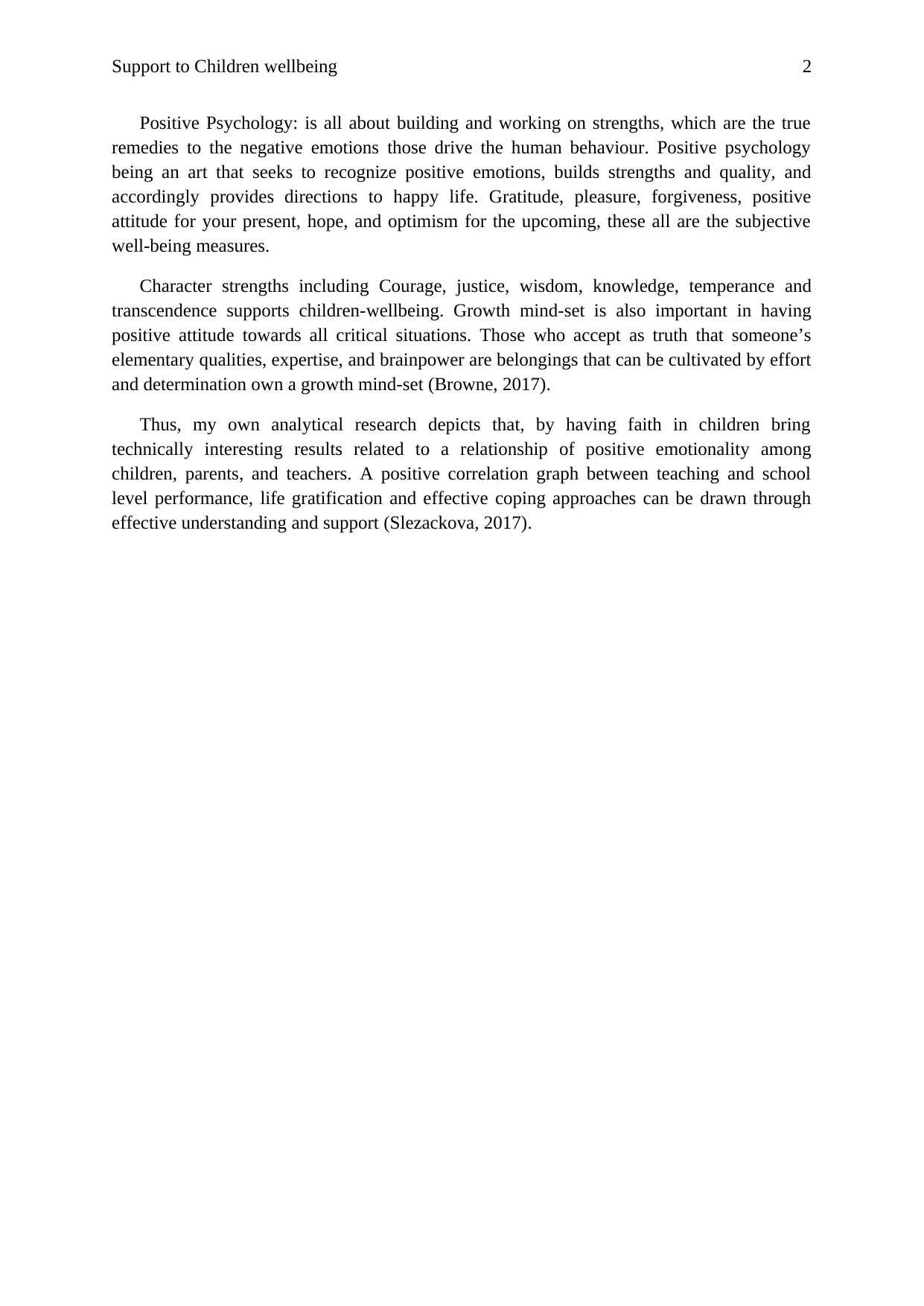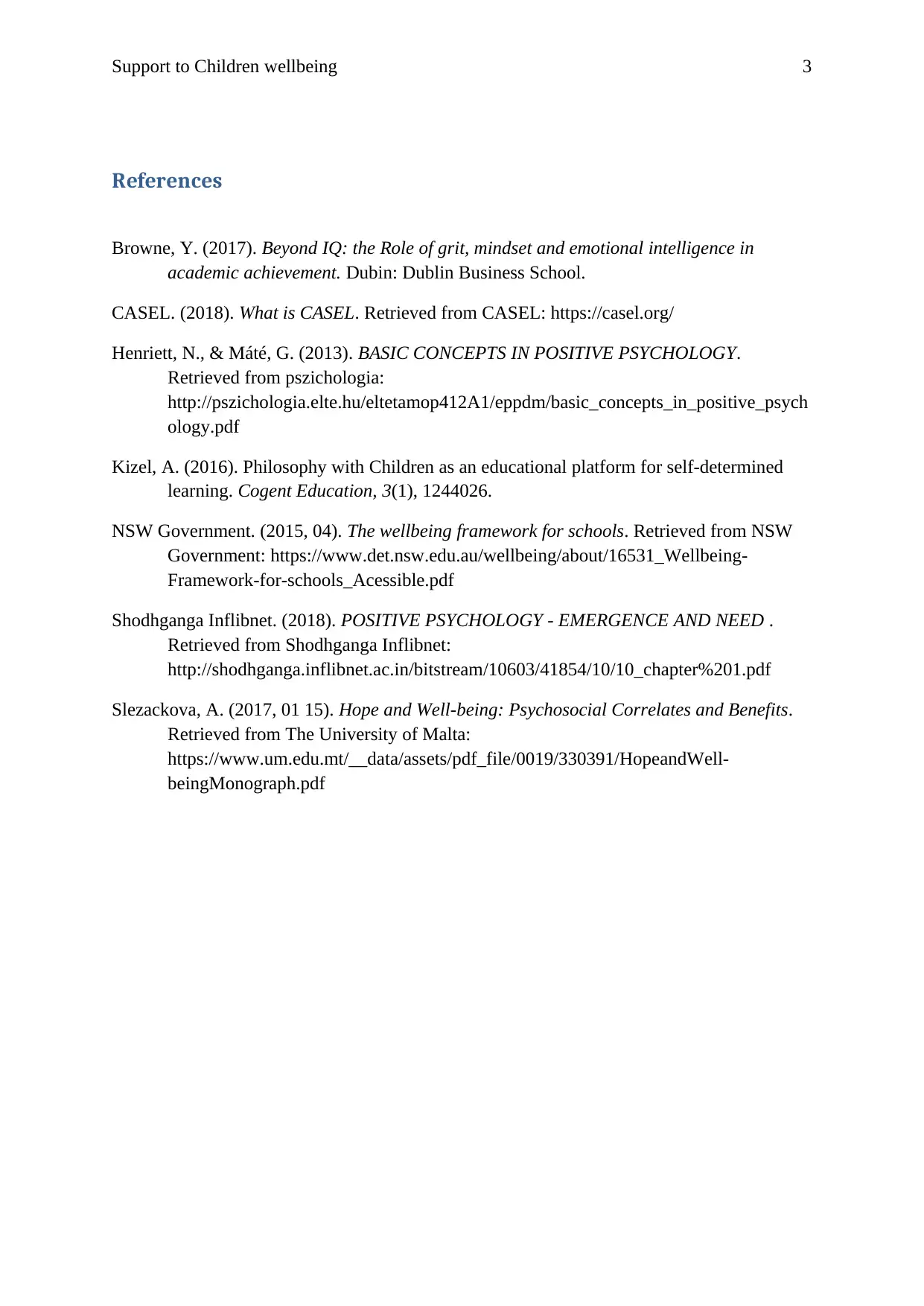Support to Children Wellbeing: Understanding and Teaching Philosophy
VerifiedAdded on 2023/06/06
|4
|898
|220
Essay
AI Summary
This essay delves into a personal philosophy for supporting children's wellbeing, focusing on a 360-degree development approach. It emphasizes the importance of quality teaching and learning, drawing upon the wellbeing framework proposed by the NSW Government. The essay highlights self-determined learning as a key element in skill development, emphasizing the learner's role and the need to consider their individual experiences and goals. It explores key concepts related to wellbeing, including humanistic psychology, emotional intelligence, CASEL, positive psychology, and growth mindset. The author analyzes the correlation between teaching, school performance, and life gratification, providing insights into effective support strategies for children. The essay concludes by highlighting the importance of building strengths, fostering positive emotions, and creating a supportive learning environment for children.

Running Head: SUPPORT TO CHILDREN WELLBEING 0
Support to Children Wellbeing
Understanding and Teaching Children
(Student Details:)
9/4/2018
Support to Children Wellbeing
Understanding and Teaching Children
(Student Details:)
9/4/2018
Paraphrase This Document
Need a fresh take? Get an instant paraphrase of this document with our AI Paraphraser

Support to Children wellbeing 1
Understanding and Teaching Children
This article will reflect a personal philosophy through which we can support the welfare
of children aiming their 360-degree development. The idea of wellbeing is never apart from
quality teaching as well as quality learning process among children and young people. In this
context, wellbeing framework of school proposed by NSW Government states that this
process of quality learning among children includes the following:
Overall development covering: Social, physical, emotional, cognitive and spiritual
areas
Entrusting children to school authorities with full confidence by the parents
Most importantly, educational institutes and teachers in the communities should be
committed to create quality-learning prospects for children and younger generation
(NSW Government, 2015).
After studying many philosophies of education and teaching, I personally analysed that
self-determined learning plays a key role in skill development phase among youth. According
to Self-determined learning concept, Learner himself is the foremost important in his or her
own learning, that occurs post individual past experiences (Kizel, 2016). I also rely on this
fact that what the learner elects to learn is worthy and he or she should hear deeply to their
mind, physique, soul, and emotions as directors to fulfil their desired goals (Kizel, 2016). In
this manner, the children need to be supple, able to shift where quality learning occurs, and
furnaces new ways, new queries to improve. During this whole process, the prominence is to
develop capability, self-reflection practice, and an understanding of learning pattern of
children during their different age phase. In this article, as we are talking about wellbeing
support system of children, so the concept of ‘Well-being’ should be discussed associated
with its key values. Well-being is not having a single extent to express it fully but several
other attributes contribute to it being the most important elements of well-being, these
measuring elements of well-being are as follows:
Humanistic Psychology: Maslow’s Humanistic concept mentions that human kind
attempts to fulfil their desires through self-actualization by putting greater effort towards
where it is needed (Henriett & Máté, 2013).
Emotional Intelligence: this measure evaluates the learner’s level of emotional-
intelligence by using four subscales: emotion observation, applying emotions, dealing with
self-related emotions, and handling others’ emotions (Shodhganga Inflibnet, 2018).
CASEL (Collaborative for Academic, Social, and Emotional Learning): it is aim is to
provide social as well as emotional quality learning from initial schooling to high school
(CASEL, 2018).
Understanding and Teaching Children
This article will reflect a personal philosophy through which we can support the welfare
of children aiming their 360-degree development. The idea of wellbeing is never apart from
quality teaching as well as quality learning process among children and young people. In this
context, wellbeing framework of school proposed by NSW Government states that this
process of quality learning among children includes the following:
Overall development covering: Social, physical, emotional, cognitive and spiritual
areas
Entrusting children to school authorities with full confidence by the parents
Most importantly, educational institutes and teachers in the communities should be
committed to create quality-learning prospects for children and younger generation
(NSW Government, 2015).
After studying many philosophies of education and teaching, I personally analysed that
self-determined learning plays a key role in skill development phase among youth. According
to Self-determined learning concept, Learner himself is the foremost important in his or her
own learning, that occurs post individual past experiences (Kizel, 2016). I also rely on this
fact that what the learner elects to learn is worthy and he or she should hear deeply to their
mind, physique, soul, and emotions as directors to fulfil their desired goals (Kizel, 2016). In
this manner, the children need to be supple, able to shift where quality learning occurs, and
furnaces new ways, new queries to improve. During this whole process, the prominence is to
develop capability, self-reflection practice, and an understanding of learning pattern of
children during their different age phase. In this article, as we are talking about wellbeing
support system of children, so the concept of ‘Well-being’ should be discussed associated
with its key values. Well-being is not having a single extent to express it fully but several
other attributes contribute to it being the most important elements of well-being, these
measuring elements of well-being are as follows:
Humanistic Psychology: Maslow’s Humanistic concept mentions that human kind
attempts to fulfil their desires through self-actualization by putting greater effort towards
where it is needed (Henriett & Máté, 2013).
Emotional Intelligence: this measure evaluates the learner’s level of emotional-
intelligence by using four subscales: emotion observation, applying emotions, dealing with
self-related emotions, and handling others’ emotions (Shodhganga Inflibnet, 2018).
CASEL (Collaborative for Academic, Social, and Emotional Learning): it is aim is to
provide social as well as emotional quality learning from initial schooling to high school
(CASEL, 2018).

Support to Children wellbeing 2
Positive Psychology: is all about building and working on strengths, which are the true
remedies to the negative emotions those drive the human behaviour. Positive psychology
being an art that seeks to recognize positive emotions, builds strengths and quality, and
accordingly provides directions to happy life. Gratitude, pleasure, forgiveness, positive
attitude for your present, hope, and optimism for the upcoming, these all are the subjective
well-being measures.
Character strengths including Courage, justice, wisdom, knowledge, temperance and
transcendence supports children-wellbeing. Growth mind-set is also important in having
positive attitude towards all critical situations. Those who accept as truth that someone’s
elementary qualities, expertise, and brainpower are belongings that can be cultivated by effort
and determination own a growth mind-set (Browne, 2017).
Thus, my own analytical research depicts that, by having faith in children bring
technically interesting results related to a relationship of positive emotionality among
children, parents, and teachers. A positive correlation graph between teaching and school
level performance, life gratification and effective coping approaches can be drawn through
effective understanding and support (Slezackova, 2017).
Positive Psychology: is all about building and working on strengths, which are the true
remedies to the negative emotions those drive the human behaviour. Positive psychology
being an art that seeks to recognize positive emotions, builds strengths and quality, and
accordingly provides directions to happy life. Gratitude, pleasure, forgiveness, positive
attitude for your present, hope, and optimism for the upcoming, these all are the subjective
well-being measures.
Character strengths including Courage, justice, wisdom, knowledge, temperance and
transcendence supports children-wellbeing. Growth mind-set is also important in having
positive attitude towards all critical situations. Those who accept as truth that someone’s
elementary qualities, expertise, and brainpower are belongings that can be cultivated by effort
and determination own a growth mind-set (Browne, 2017).
Thus, my own analytical research depicts that, by having faith in children bring
technically interesting results related to a relationship of positive emotionality among
children, parents, and teachers. A positive correlation graph between teaching and school
level performance, life gratification and effective coping approaches can be drawn through
effective understanding and support (Slezackova, 2017).
⊘ This is a preview!⊘
Do you want full access?
Subscribe today to unlock all pages.

Trusted by 1+ million students worldwide

Support to Children wellbeing 3
References
Browne, Y. (2017). Beyond IQ: the Role of grit, mindset and emotional intelligence in
academic achievement. Dubin: Dublin Business School.
CASEL. (2018). What is CASEL. Retrieved from CASEL: https://casel.org/
Henriett, N., & Máté, G. (2013). BASIC CONCEPTS IN POSITIVE PSYCHOLOGY.
Retrieved from pszichologia:
http://pszichologia.elte.hu/eltetamop412A1/eppdm/basic_concepts_in_positive_psych
ology.pdf
Kizel, A. (2016). Philosophy with Children as an educational platform for self-determined
learning. Cogent Education, 3(1), 1244026.
NSW Government. (2015, 04). The wellbeing framework for schools. Retrieved from NSW
Government: https://www.det.nsw.edu.au/wellbeing/about/16531_Wellbeing-
Framework-for-schools_Acessible.pdf
Shodhganga Inflibnet. (2018). POSITIVE PSYCHOLOGY - EMERGENCE AND NEED .
Retrieved from Shodhganga Inflibnet:
http://shodhganga.inflibnet.ac.in/bitstream/10603/41854/10/10_chapter%201.pdf
Slezackova, A. (2017, 01 15). Hope and Well-being: Psychosocial Correlates and Benefits.
Retrieved from The University of Malta:
https://www.um.edu.mt/__data/assets/pdf_file/0019/330391/HopeandWell-
beingMonograph.pdf
References
Browne, Y. (2017). Beyond IQ: the Role of grit, mindset and emotional intelligence in
academic achievement. Dubin: Dublin Business School.
CASEL. (2018). What is CASEL. Retrieved from CASEL: https://casel.org/
Henriett, N., & Máté, G. (2013). BASIC CONCEPTS IN POSITIVE PSYCHOLOGY.
Retrieved from pszichologia:
http://pszichologia.elte.hu/eltetamop412A1/eppdm/basic_concepts_in_positive_psych
ology.pdf
Kizel, A. (2016). Philosophy with Children as an educational platform for self-determined
learning. Cogent Education, 3(1), 1244026.
NSW Government. (2015, 04). The wellbeing framework for schools. Retrieved from NSW
Government: https://www.det.nsw.edu.au/wellbeing/about/16531_Wellbeing-
Framework-for-schools_Acessible.pdf
Shodhganga Inflibnet. (2018). POSITIVE PSYCHOLOGY - EMERGENCE AND NEED .
Retrieved from Shodhganga Inflibnet:
http://shodhganga.inflibnet.ac.in/bitstream/10603/41854/10/10_chapter%201.pdf
Slezackova, A. (2017, 01 15). Hope and Well-being: Psychosocial Correlates and Benefits.
Retrieved from The University of Malta:
https://www.um.edu.mt/__data/assets/pdf_file/0019/330391/HopeandWell-
beingMonograph.pdf
1 out of 4
Related Documents
Your All-in-One AI-Powered Toolkit for Academic Success.
+13062052269
info@desklib.com
Available 24*7 on WhatsApp / Email
![[object Object]](/_next/static/media/star-bottom.7253800d.svg)
Unlock your academic potential
Copyright © 2020–2026 A2Z Services. All Rights Reserved. Developed and managed by ZUCOL.





